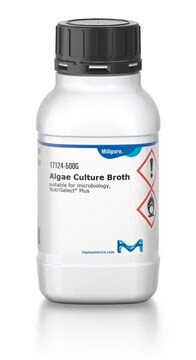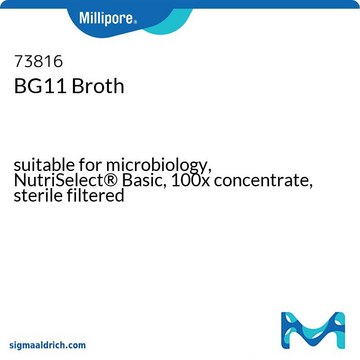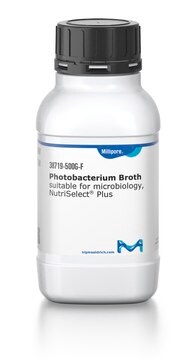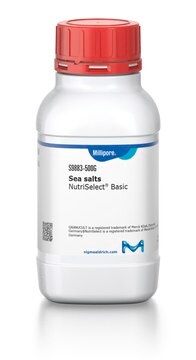B5282
Bold Modified Basal Freshwater Nutrient Solution
50 ×, liquid, suitable for plant cell culture
Sign Into View Organizational & Contract Pricing
All Photos(1)
About This Item
UNSPSC Code:
10171502
NACRES:
NA.72
Recommended Products
sterility
sterile-filtered
Quality Level
form
liquid
concentration
50 ×
technique(s)
cell culture | plant: suitable
application(s)
agriculture
storage temp.
2-8°C
Application
Bold Modified Basal Freshwater Nutrient Solution, 50x is a chemstock used to prepare Bold Modified Freshwater Nutrient Solution for use in phycology/algae studies.
Formula variant
With major salts and trace elements. Modified with trace elements as requested for ASTM TOXICITY TESTS E1193 and E1295 conducted with Daphnia species.
Reconstitution
Storage Class Code
12 - Non Combustible Liquids
WGK
WGK 1
Flash Point(F)
Not applicable
Flash Point(C)
Not applicable
Certificates of Analysis (COA)
Search for Certificates of Analysis (COA) by entering the products Lot/Batch Number. Lot and Batch Numbers can be found on a product’s label following the words ‘Lot’ or ‘Batch’.
Already Own This Product?
Find documentation for the products that you have recently purchased in the Document Library.
Customers Also Viewed
Jakub Nedbal et al.
HardwareX, 8, e00143-e00143 (2021-01-15)
A bottom-illuminated orbital shaker designed for the cultivation of microalgae suspensions is described in this open-source hardware report. The instrument agitates and illuminates microalgae suspensions grown inside flasks. It was optimized for low production cost, simplicity, low power consumption, design
Osamu Nishimura et al.
PloS one, 10(11), e0143525-e0143525 (2015-11-21)
We established a laboratory clonal strain of freshwater planarian (Dugesia japonica) that was derived from a single individual and that continued to undergo autotomous asexual reproduction for more than 20 years, and we performed large-scale genome sequencing and transcriptome analysis
S Nandini et al.
Waste management & research : the journal of the International Solid Wastes and Public Cleansing Association, ISWA, 28(10), 928-935 (2009-09-15)
The ability of rotifers and cladocerans to convert primary to secondary production in wastewaters was tested. Scenedesmus acutus was cultured on Bold's (defined) medium, wastewater from the tertiary phase of water treatment and a mixture of both. The algal growth
Eloísa Ramos-Rodríguez et al.
The Journal of experimental biology, 223(Pt 7) (2020-02-29)
Organisms with wide environmentally induced morphological plasticity and cosmopolitan distribution, e.g. the common freshwater rotifer Keratella cochlearis, are ideal models to study the evolution of plastic polymorphisms and the capacity of zooplankton to adapt to local selection conditions. We investigated
Sing-Lai Lim et al.
Bioresource technology, 101(19), 7314-7322 (2010-06-16)
The potential application of Chlorella vulgaris UMACC 001 for bioremediation of textile wastewater (TW) was investigated using four batches of cultures in high rate algae ponds (HRAP) containing textile dye (Supranol Red 3BW) or TW. The biomass attained ranged from
Our team of scientists has experience in all areas of research including Life Science, Material Science, Chemical Synthesis, Chromatography, Analytical and many others.
Contact Technical Service









